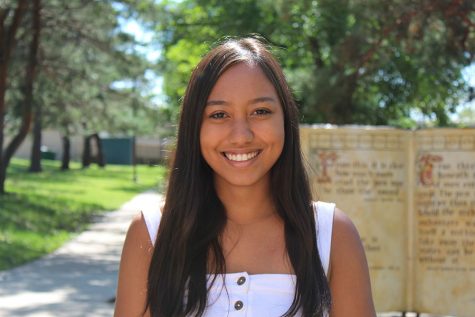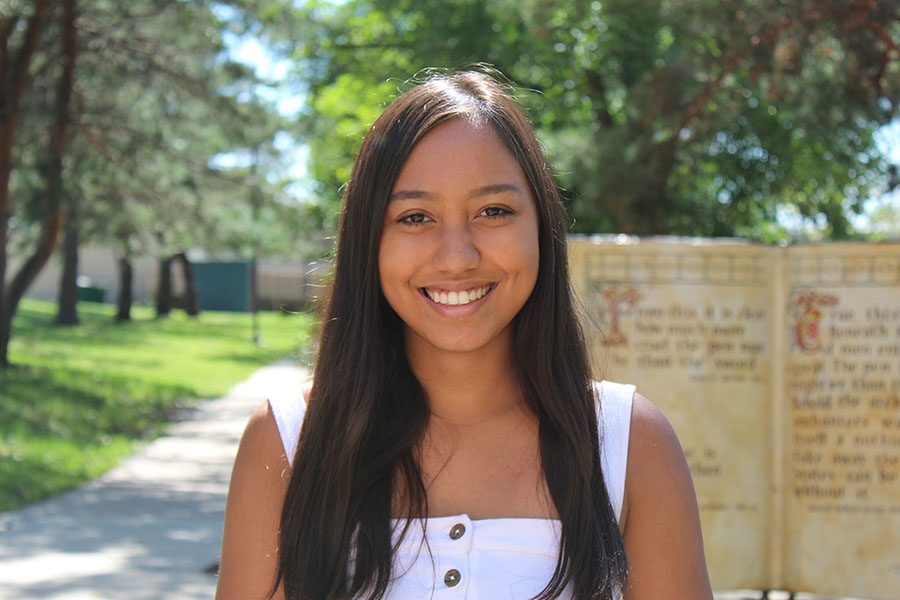The name game
Reporter Anjali Huynh outlines why correctly pronouncing names should be more of a priority in American society.
Anjali Huynh ’19 talks about name pronunciation in her column.
For many students, the first day of school signifies the beginning of a new grade, the chance to begin a period of educational promise and renewed social growth. While these feelings remain true for me, the ringing of the first bell always inevitably brings forward one thought: How will my new teacher butcher my name this time?
To put it mildly, Anjali Linh Huynh is not a common “American” name. Having Vietnamese and Indian heritage, my parents gave me a name that paid respect to their backgrounds. I have never been ashamed of this. Because my upbringing lacked customary Asian traditions or nearby relatives, I often fell back on my name as a reminder that my ethnic identity was valid.
Yet the same thing that gave me a sense of pride and individuality transformed into a weapon others used against me. Though neither I nor my parents changed my name, others decided to undertake this task themselves. My “foreign” name becomes nothing short of a guessing game, an inconvenient tongue twister for the reader to stumble over. While my name is supposed to be pronounced “Uhn-juh-lee,” I have been called anything from “On-jolly” to “Ann-jol-eye” to even names as baffling as “Angela.”
To some degree, I understand unintentional mispronunciations. After all, making mistakes is a part of human nature. However, the biggest offense is the lack of effort when it comes to respecting non-traditional names. It is not so much the initial mispronunciations that are disturbing, but rather, the lack of effort involved. Oftentimes, others take a look at my seemingly-difficult name and give up before they even start. Or, after I clarify the pronunciation multiple times, they still mispronounce it until I ultimately feel too defeated to care.
As a result of constant errors, many people with non-Western names, including myself, adapt to a toxic culture of ignorance. This often involves completely changing names to make them “easier” to pronounce. When I said my name at coffee shops or clothing stores, little expressions of frustration or sighs of disapproval appeared, followed by a rude, “And how do you spell that?” Now, I often resort to saying that my name is “Anna” to avoid inconveniencing employees. Similarly, many of my friends westernized their names themselves, going solely by “English names” rather than birth names.
What I came to realize, however, was that by doing such things, we give up a part of our identities solely for the comfort of others. As someone who is already isolated from my ethnic culture, this forced assimilation feels like betrayal. Dismissing name mispronunciations as insignificant or part of the status quo is incredibly ethnocentric.
When names are deemed “too difficult” or “too foreign” to pronounce, what this really means is that others do not care about the individual’s culture to begin with. Suggesting that a name is challenging because it is different implies that people get a pass to blatantly disregard correct pronunciation because a name is alien to them. Continuing a tradition of accepting ignorance and indifference does not better the community; instead, it hinders a potential learning opportunity.
A person’s name is as integral to their identity as the gender they identify with or the color of their skin. It is the first thing people learn when meeting a new person, the first form of identification that people know. The standard should not be having students adapt their names to fit others’ standards or allowing others to continue failing to pronounce names correctly. Instead, individuals should consider the respect they would like to see with their own names and apply it to others.
Being understanding and accepting of other cultures remains a difficult task for many, especially given the current climate in this country. Kindness and respect are attributes that others should be willing to ingrain into their everyday routines. Anyone can adopt these characteristics in a manner of ways through showing regard for other names and building respectful, culturally-aware communities. Simply asking someone to clarify how to correctly pronounce their name can go a long way.
So the next time, dear reader, that you stumble across a name that seems to require a manipulation of your tongue in a manner you think not to be possible, I advise you to look again. Each pronunciation, no matter how seemingly insignificant or irrelevant in the grand scheme of things, does matter. I can assure you that these individuals will be grateful for the time and effort exercised in doing so.
Your donation will support the student journalists of West High School. Your contribution will allow us to purchase Scholarship Yearbooks, newsroom equipment and cover our annual website hosting costs.

Anjali is a senior and third-year staffer on West Side Story. She is the Print Managing Editor and Co-Copy Editor. When she's not complaining about Oxford...



